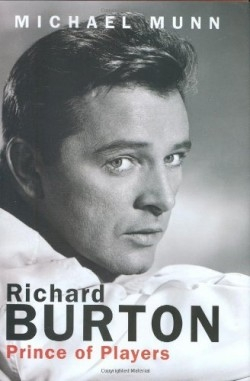Richard Burton
Prince of Players
“Poetry and drink are the greatest things on earth. Besides women,” said the renowned Shakespearian and Hollywood actor with the mellifluous voice.
In Richard Burton, author and film critic Michael Munn presents a biography written from his memories of his friend and inter-views with actors such as John Gielgud, Roddy McDowall, and Peter O’Toole.
Richard Jenkins (1925-1984) was born in Pontrhydyfen, Wales, the twelfth of thirteen children. His father, a coal miner, was a “scallywag” who drank while telling uproarious tales sloshed with pints at the Miner’s Arms. His mother died when he was two. Richard loved playing rugby and began smoking and drinking with his mates at age twelve. At school he liked reading, and in 1941, tried his luck as Mr. Vanhattan in Shaw’s The Apple Cart; “I was terrible,” he told Munn.
Richard joined the Royal Air Force in 1944, and an inducement for enlisting accorded him a short university course at Oxford; he stud-ied English and acted in Measure for Measure. Attending Oxford was facilitated by Philip Burton, who had to become his legal fa-ther to make entrance happen; Richard Jenkins was now Richard Burton. Philip became his cultural mentor, constantly discussing books, poetry, and theatre, and coaching him in long passages of Shakespeare with instruction in diction, interpretation, and delivery. “Shakespeare was the best way to learn English,” Richard said. He also loved to recite the poetry of Dylan Thomas, an-other hard drinking Welshman, and had a marvelous memory; he was able to recite Shakespeare’s sonnets backwards, while drunk.
In 1951 Anthony Quayle picked Burton to play Prince Hal in Henry IV Parts I and II at Stratford. Munn writes that it was the “highlight of Richard’s career—his life—up to that point.” Quayle thought he had “mystical talent.” Richard continued to have success with such roles as Hamlet and Coriolanus.
In 1952 he went to Hollywood, played the leading man in My Cousin Rachel, and received his first of seven Oscar nominations. Other critically acclaimed movies were Becket, Who’s Afraid of Virginia Woolf, and The Night of the Iguana. There were, however, movies that disappointed, such as Alexander the Great and Prince of Players. In 1960 he won a Tony Award as King Arthur in Camelot.
The handsome and eloquent man with blue-green eyes was “testosterone-driven.” He had numerous intimate connec-tions with women and actresses such as Claire Bloom, Lana Turner, and Jean Simmons. He married five times, twice to Elizabeth Taylor (1964-1974 and 1975-1976). They had become involved on the set of Cleopatra in 1963 and their liaison became known as “the most public adultery in the world,” wrote Brenda Maddox. Burton later said of Liz, “She was the greatest ad-venture of my life.”
Munn tells of a drive he took in 1974 with Richard, looking for a pub for lunch and wanting to escape for a little while from the filming of Brief Encounter. During the meal Burton appeared unsettled. Back in the car, Richard said, “pull over”; he staggered out, shaking, fell to the ground, and blacked out. Minutes later Burton revealed to Munn his fear of “something wrong in my head.” He’d had an epileptic fit. Richard also was subject to chronic depression, and thought “booze-up” the antidote to both. At one time he was up to three bottles of vodka a day.
Burton died at his home in Céligny, Switzerland, of a cerebral hemorrhage at the age of fifty-eight. He once said, “The only thing in life is language.”
Disclosure: This article is not an endorsement, but a review. The publisher of this book provided free copies of the book to have their book reviewed by a professional reviewer. No fee was paid by the publisher for this review. Foreword Reviews only recommends books that we love. Foreword Magazine, Inc. is disclosing this in accordance with the Federal Trade Commission’s 16 CFR, Part 255.

